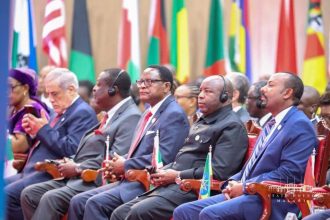Solar power for water supply
Surging electricity tariffs make it tricky for water boards to cope with rising energy bills.
The water suppliers struggle to catch up since they require approval from the Ministry of Forestry and Natural Resources to raise water tariffs.
To reduce the bills, water engineers are looking at solar energy as a reliable and affordable alternative to intermittent grid power.
For Central Region Water Board (CRWB) acting chief executive officer John Makwenda, the power of sunlight signals the future of water supply as electricity tariffs outpace water bills.

Solar energy has cut electricity bills and boosted water supply in Dedza
Drilling deeper
CRWB, which supplies nine districts, is turning to solar energy amid frequent and prolonged droughts that disrupt hydropower generation and water supply as silted rivers and dams keep running dry.
This has proved a game-changer in the Central Region, where boreholes constitute the majority of sources of piped water even though CRWB gets bigger volumes from rivers and dams.
Makwenda explains: “Normally, we drill 40 to 60 metres because we find water at that depth, but it has changed over the years. With drought and loss of trees, the aquifers [underground rivers] have run out of water.
“With the old technology, water supply became tricky. We needed to drill deeper to get water, especially because we couldn’t supply adequate water due to frequent and lengthy blackouts caused by the droughts and loss of green cover.”
CRWB has drilled six solar-powered boreholes in Ntchisi, Ntcheu, Dedza and Salima. The nearly 100m-deep boreholes yield up to 10 litres per second, boosting supply.
This is part of the Malawi Drought Recovery and Resilience Project (MDRRP) funded by the World Bank in partnership with Malawi Government.
The switch to solar energy has almost halved electricity bills in the four districts while improving water supply for the benefit of customers, shows early findings.
Victoria Benjamin, from Ntcheu, states: “Here, we could only get water for three hours if we were lucky. Now we have water almost all day. This is a huge improvement.
“Women no longer waste hours walking to crowded water sources or unprotected wells, which fuel preventable water-related diseases.”
Makwenda says solar energy is the way to go.
He explains: “While Escom announces power tariff hikes almost every year, we take two to three years to raise water tariffs because we cannot do so without approval from our line ministry.
“As such, we had to find a solution to high electricity bills, which eat into our revenue. As part of the ongoing public sector reforms, CRWB suggested solar energy to cut electricity bills.”
The benefits have been instant.
For instance, solar-powered pumps have slashed the monthly electricity bills from K2.4 million to K1.3 million in Ntcheu, K3.1 million to K1.7 million in Dedza and K600 000 to K300 000 in Salima.
“With solar energy, we no longer have to worry about interruptions to grid power, especially during sunny days, because the solar power system has the capacity to run all the boreholes,” says the engineer.
This is a big relief for both CRWB and its customers.
Makwenda brags: “We can’t ask for more. Since the power side is sorted out, the water supply side has also improved because of the uninterrupted power supply.
“We switch to Escom after sunset or when there are clouds.”
As electricity consumption falls, supply has improved. Ntcheu residents now get water for over 18 hours, from just four before 2020 when the solar-powered pumps started working. The supply period has more than doubled from eight to 20 hours in Dedza and from 15 hours to 20 hours in Salima. Ntchisi customers get water for 15 hours, up from just five.
Facing the future
CRWB plans to replicate the lessons from the MDRRP in Mchinji, Mponela and Madisi, which rely on overwhelmed boreholes that are 40 to 50m deep and drying surface sources.
“We strongly desire to invest in solar-powered boreholes because we believe we have taken the right direction.
“With the solar-powered boreholes, we are on course to close the gap between supply and demand, especially with the difference in power consumption,” Makwenda says. “As the water supply stutters due to climate change and environmental degradation, he thanks the Government and World Bank for improved water supply. We have the lessons, we have the technology that works and we know it’s the way to go. And customers benefit.”





